必修4unit1 using language
Unit 1 Using language 人物介绍 高中英语人教版(2019)选择性必修第一册
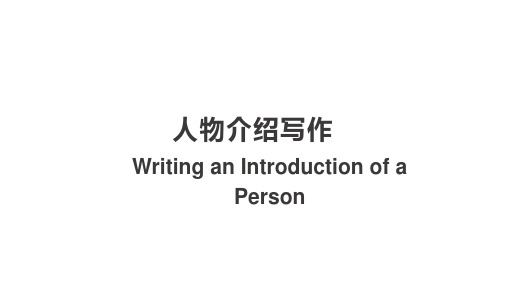
Yuan Longping’s work is so important that he helped solve the problem of food shortage
The person I admire most is Yuan Longping, a committed and patient agricultural scientist in our country. He was well-known because he devoted his entire life to improving the technology of hybrid rice
Born in +地点+时间,sb. graduated from…. Born into a ….family, sb did sth
• 袁隆平1930年出生于北京,毕业于西南农业大学(Southwest Agricultural College). • 宋庆龄出生在一个富裕的家庭,接受了良好的教育并到美国学习。 • 他出生在一个音乐世家(musical family),在她还是个小女孩的时候就显示出她的音乐
Para2.人物介绍-主要事迹 In 1967, she was chosen to join a team of scientists with the objective of discovering a new treatment for malaria. Her team examined many old medical tests, and evaluated lots of plants for their medical properties. They even insisted on testing the
外研必修第一册Unit4_Using_language_板块教学设计

1.To find out the structure, function and linking words of the attributive clauses.
Unit4 Using language板块教学设计
Using language板块教学设计
(建议时长80–90分钟,教师可根据教学实际酌情调整。)
课型
Reading+ Listening + Speaking
主题语境
人与社会——良好的人际关系与社会交往
内容分析
本板块分为三部分,为语法、词汇和听说的综合活动。语法部分包括对定语从句的感知发现、规律总结和真实语境运用,其中两个小语篇的话题分别为“我的朋友”和“社团招新”,前者描述了和朋友相处的细节,后者以网络论坛的形式介绍了远足社团,欢迎志同道合的朋友加入;词汇部分以“友谊汤”食谱的形式呈现了有关友谊的可贵行为和品质的词汇,帮助学生描述、评价朋友的行为和品质;听说部分呈现了两位朋友间的一段对话,引导学生帮助朋友排忧解难。
教学目标
在本板块学习结束时,学生能够:
1.熟悉并运用定语从句;
2.掌握与友情相关的词汇;
3.理解什么是真正的朋友;
4.针对自己在交友过程中的问题找到正确的解决方法。
教学重点
1.引导学生了解限定性定语从句的基本特征并在真实语境中运用;
2,讨论朋友的行为和品质;
3.Teacher checks the answers with the class.
Unit+1+Looking+ForwardsUsing+language外研版选择性必修第四册+

Look at the sentences from the reading passage. Decide which tense each is in and match the tenses to what they describe.
f 4. An action that started in the past and may
Complete them with the correct form .
I 3 __h_a_v_e_b_e_e_n__li_v_i_n_g_/__h_a_v_e_l_iv_e_d______ (live) in this Cambodian village for two months. Despite the hard physical work, I 4 d_o__n_’t__re_g_r_e_t_/__h_a_v_e_n_’_t_r_e_g_r_e_tt_e_d__(not regret) for one moment choosing to spend my gap year as a volunteer for the Cambodia Foundation. It is wonderful to meet such friendly local people who are happy to share their lives with us.
What difficult decision is Li Ling
facing?
apply to the Medical School there. I can’t make
up my mind what the right thing to do is.
What’s up,
怎么了,
人教版高中英语必修4Reading和using language原文加翻译

必修4 Unit 1A STUDENT OF AFRICAN WILDLIFEIt is 5:45 am and the sun is just rising over Gombe National Park in East Africa. Following Jane's way of studying chimps, our group are all going to visit them in the forest. Jane has studied these families of chimps for many years and helped people understand how much they behave like humans. Watching a family of chimps wake up is our first activity of the day. This means going back to the place where we left the family sleeping in a tree the night before. Everybody sits and waits in the shade of the trees while the family begins to wake up and move off. Then we follow as they wander into the forest. Most of the time, chimps either feed or clean each other as a way of showing love in their family. Jane warns us that our group is going to be very tired and dirty by the afternoon and she is right. However, the evening makes it all worthwhile. We watch the mother chimp and her babies play in the tree. Then we see them go to sleep together in their nest for the night. We realize that the bond between members of a chimp family is as strong as in a human family.Nobody before Jane fully understood chimp behaviour. She spent years observing and recording their daily activities. Since her childhood she had wanted to work with animals in their own environment. However, this was not easy. When she first arrived in Gombe in 1960, it was unusual for a woman to live in the forest. Only after her mother came to help her for the first few months was she allowed to begin her project. Her work changed the way people think about chimps. For example, one important thing she discovered was that chimps hunt and eat meat. Until then everyone had thought chimps ate only fruit and nuts. She actually observed chimps as a group hunting a monkey and then eating it. She also discovered how chimps communicate with each other, and her study of their body language helped her work out their social system.For forty years Jane Goodall has been outspoken about making the rest of the world understand and respect the life of these animals. She has argued that wild animals should be left in the wild and not used for entertainment or advertisements. She has helped to set up special places where they can live safely. She is leading a busy life but she says: "Once I stop, it all comes crowding in and I remember the chimps in laboratories. It's terrible. It affects me when I watch the wild chimps. I say to myself, 'Aren't they lucky?" And then I think about small chimps in cages though they have done nothing wrong. Once you have seen that you can never forget ..."She has achieved everything she wanted to do: working with animals in their own environment, gaining a doctor's degree and showing that women can live in the forest as men can. She inspires those who want to cheer the achievements of women.。
Unit 1 Face values Using language课件高中英语外研版选择性必修四

What
Read the descriptions and match them
1. He is able to transform into various animals and objects. People often regard him as frightful or monstrous, but in fact he is just and righteous. When there’s danger, he never hesitates to protect others.
1. What’s the role of the words in bold? To act as the subject of the sentence.
a … what I say is that my pictures aren’t hurting anyone, so who cares? b “That my pictures aren’t hurting anyone is what I say, so who cares?” c It’s true that inner beauty is very important ... d That inner beauty is very important is true ...
righteous 公正的 ; 正直的
danger 危险 ; 风险 hesitates 犹豫,迟疑不决 ;
Take notes quickly!
a. Jane Eyre
2. She is small and her face is plain. Despite a difficult childhood, she grows up to be an independent, determined and generous young woman. She remains true to herself and never loses hope in her search for love and happiness.
高中英语Unit1 SectionⅢUsingLanguage课件新人教版选择性必修第四册
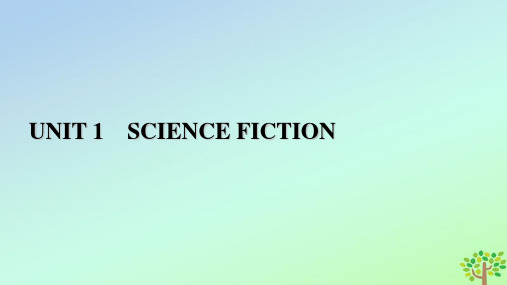
9.__n_i_ec_e___ n. 侄女;外甥女→(反义词)__n_e_p_h_e_w__ n. 侄子,外甥 10._f_e_t_ch____ vt. (去)拿来;(去)请来 11._h_a_n_d_k_e_r_c_h_ie_f____ n. 手帕;纸巾 12._l_a_m_p___ n. 灯;台灯 13._p_a_c_e___ n. 速度;步伐;节奏 vt. & vi. 确定速度;调整节奏 14._d_i_v_i_si_o_n____ n. 分开;分隔;差异;除(法)
单句语法填空 ①She was going too fast so I decided to keep riding __a_t__ my own pace. ②He found John __p_a_c_i_n_g__(pace) around the flat, unable to sleep. ③A group of the world’s best skiers will be going through their __p_a_c_e_s__ (pace).
5.__p_a_n_e_l__ n. 控制板;仪表盘;专家咨询组 6.__i_n_c_h__ n. 英寸 7.__b_a_c_k_w_a_r_d_s__ adv. 向后;倒着;往回 →(反义词)__f_o_r_w_a_r_d_s__ adv. 向前方,继续向前 8.__g_r_ip___ vt. & vi. 紧握;抓紧
Ⅱ.重点短语 1.__p_r_o_s_a_n_d_c_o_n_s__事物的利与弊;支持与反对 2.__t_ak_e__o_v_e_r__ 占上风;取而代之;接管;接手 3.__c_o_n_f_li_c_t _w_i_th____ 与……冲突或抵触 4.__t_u_rn__o_u_t __ 关掉;熄灭;在场;使朝外;结果是 5.__f_a_ll_a_w_a_y___ (逐渐)减少;消失 6.__h_a_v_e_a_n__u_rg_e__to__d_o_s_t_h_. __ 有强烈的欲望做某事
Unit 1 Using language(教学设计)高中英语人教版(2019) 选择性必修第一册
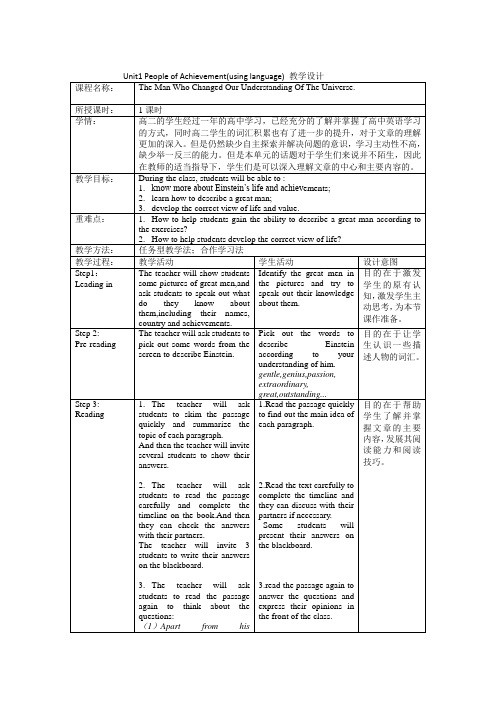
gentle,genius,passion, extraordinary, great,outstanding...
目的在于让学生认识一些描述人物的词汇。
(2)Find the descriptions that tell us what Einstein looked like and what kind of person he was?
目的在于培养学生的探索思维和举一反三的能力,同时发展学生的合作学习能力。
Step5:
Writing
The teacher will ask students to find out the useful expressions from the passage that will be used to describe someone.
The teacher will invite 3 students to write their answers on the blackboard.
3.The teacher will ask students to read the passage again to think about the questions:
1.Read the passage quickly to find out the main idea of each paragraph.
2.Read the text carefully to complete the timeline and they can discuss with their partners if necessary.
人教课标版高中英语必修4 Unit1_Reading_for_writing_公开课原创教学设计
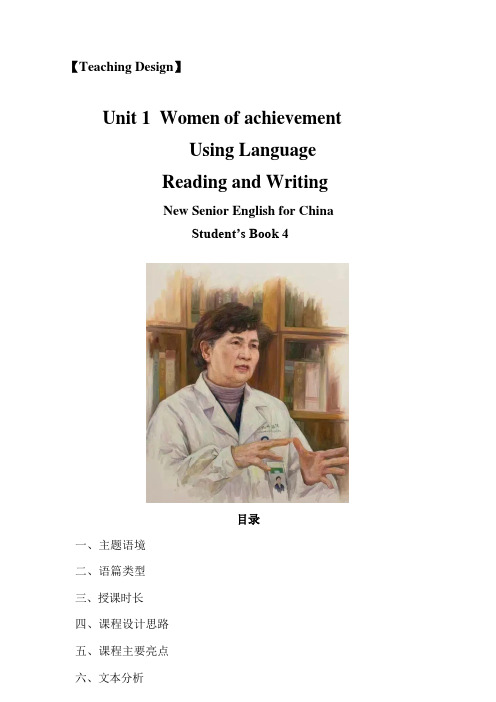
【Teaching Design】Unit 1 Women of achievementUsing LanguageReading and WritingNew Senior English for ChinaStudent’s Book 4目录一、主题语境二、语篇类型三、授课时长四、课程设计思路七、学情分析八、教学内容九、教学目标十、教学重点十一、教学难点十二、教学方法十三、教学资源十四、教学过程十五、板书设计十六、附录一、主题语境人与社会——科学家与科学研究二、语篇类型介绍性文章——人物类描写三、授课时长40 分钟四、课程设计思路课程设计灵感来源于在新冠疫情期间,师生们看到对李兰娟院士和奋战在抗击疫情最前线的女医护人员的新闻报道,心中崇拜之情油然而生。
与此同时,奋战在防疫检验一线的女社区工作人员、女交警、疫情期间停课不停教的女老师以及为同学们做好在家学习各项后勤保障的母亲等这些我们身边平凡而又伟大的女性都让老师和学生感动不已。
必修四第一单元话题是“卓有成就的女性”,而Using Language部分也是对女医生林巧稚的介绍,因此本人产生了让学生借助文本掌握如何对人物进行描述的技能,对李兰娟院士进行描写,加深学生对伟大女性的了解并向之学习的设计思路。
在确定文本之后,课程设计主要是五个环节:一、导入主题语境,即卓有成就的的女性。
二、对语篇进行探究,找出人物介绍的必要因素。
三、对该类型写作中词汇、句型等进行拓展。
四、进行话题写作并对文章进行打磨。
五、感情升华,使学生对卓有成就的的女性有了新的了解并向她们学习,从而升华主题,达到在文本中培养学生英语学科素养的目的。
本课采用任务驱动教学法,整体设计环环相扣,层层递进,把语言知识学习、语言技能的运用、思维品质发展和文化意识形成有机融入课程内容和教学活动中,为在课堂教学中培养学生的英语学科核心素养进行了有益的尝试和探索。
五、课程主要亮点1、导入新颖导入部分关于对伟大女性的高贵品质这一部分运用了“Flying words”环节,学生看到屏幕上飞驰而过的单词大声读出,这让学生对描述品格的词汇有了更加直观的了解,并帮助学生做好与上节课的衔接以及本节课写作词汇输入的工作。
新外研社(19)高中英语必修一Unit4Friendsforever-UsingLanguage教案
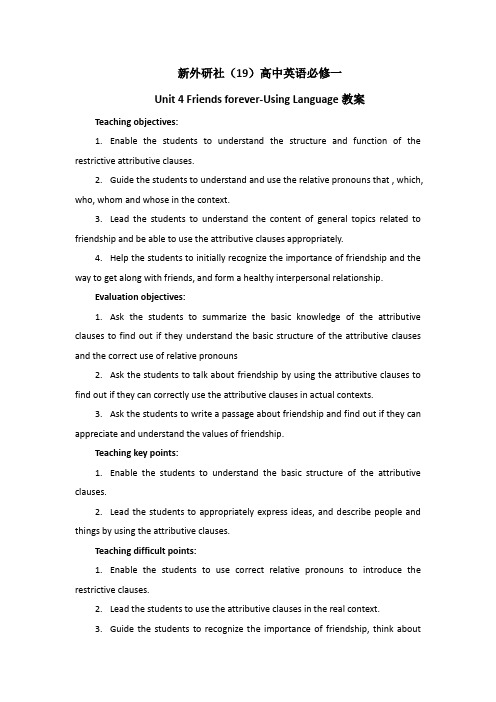
新外研社(19)高中英语必修一Unit 4 Friends forever-Using Language教案Teaching objectives:1.Enable the students to understand the structure and function of the restrictive attributive clauses.2.Guide the students to understand and use the relative pronouns that , which, who, whom and whose in the context.3.Lead the students to understand the content of general topics related to friendship and be able to use the attributive clauses appropriately.4.Help the students to initially recognize the importance of friendship and the way to get along with friends, and form a healthy interpersonal relationship.Evaluation objectives:1.Ask the students to summarize the basic knowledge of the attributive clauses to find out if they understand the basic structure of the attributive clauses and the correct use of relative pronouns2.Ask the students to talk about friendship by using the attributive clauses to find out if they can correctly use the attributive clauses in actual contexts.3.Ask the students to write a passage about friendship and find out if they can appreciate and understand the values of friendship.Teaching key points:1.Enable the students to understand the basic structure of the attributive clauses.2.Lead the students to appropriately express ideas, and describe people and things by using the attributive clauses.Teaching difficult points:1.Enable the students to use correct relative pronouns to introduce the restrictive clauses.2.Lead the students to use the attributive clauses in the real context.3.Guide the students to recognize the importance of friendship, think aboutways to get along with friends, and form a healthy interpersonal relationship.Teaching methods:Cooperative Teaching Method; Task-based Approach; Communicative Approach Teaching procedures:Step1:Listen to an English song and finish the following tasks.1.Fill in the blanks with the correct lyrics.(1)Love is one big illusion——I should try to forget.(2)You’re the one——set it up now.(3)I’m the one——is feeling lost right now.(4)Now you want me to forget every little thing——you said.2.What type of clauses are the underlined parts in the sentences?_____________________________________________________Suggested answers:1.(1)that(2)who(3)who(4)that2.The attributive clauses.Step2:Look at the sentences from the reading passage and answer the questions.a.We can...stay in touch with the people that we want to remain friends with.b.The digital age also enables us to find people who share our interests...(1)What does “that” refer to in sentence (a)?(2)What does “who” refer to in sentence (b)?c.We can...stay in touch with the people.We want to remain friends with them.d.The digital age also enables us to find people.These people share our interests...(3)What is the difference between the two groups of sentences?(4)Why does the author choose to use sentences (a) and (b) in the reading passage?(5)What other words are used to introduce attributive clauses?What do they refer to?Suggested answers:(1)the people(2)people(3)Sentences (a) and (b) both contain a clause defining a noun in each sentence.Sentences (c) and (d) are each constructed with a pair of simple sentences,with one defining a noun that appears in the other sentence in each pair.(4)Because there is a closer link and connection between “people” and the clause defining it in sentences (a) and (b).It also makes the passage clearer,and creates an emphatic effect on the people or things being defined.(5)Other words used to introduce attributive clauses include “which,whom,whose”.They can refer to an object,a thing,or a person as the object of an action and the relationship of belonging.Step3:More sentences with the attributive clauses in the reading passage(1)What if...was writing letters took ages to be delivered?(2)We can...stay in touch with the people we want to remain friends with.(3)All you need is a wi-fi connection.(4)The digital age also enables us to find people share our interests...(5)Whatever our hobbies,the Internet can connect us with others also enjoy doing them...(6)...people tend to post only positive updates make them appear happy and friendly.(7)Although technology has changed the way we acquire friends,the meaning of...(1)that(2)that(3)that(4)who(5)who (6)that(7)thatStep4:Grammar focus1.定义在复合句中,充当的从句是定语从句,被定语从句限定的词是,引导定语从句的词叫做或.2.结构:++3.关系词的作用(1)连接和(2)指代(3)在从句中4.画出下列各句中定语从句的先行词和关系词,并判断关系词的类别(人、物),同时写出关系词在从句中所作的成分(主语、宾语、定语)。
人教课标版高中英语必修4 Unit1_Using_Language_重难点词汇详解
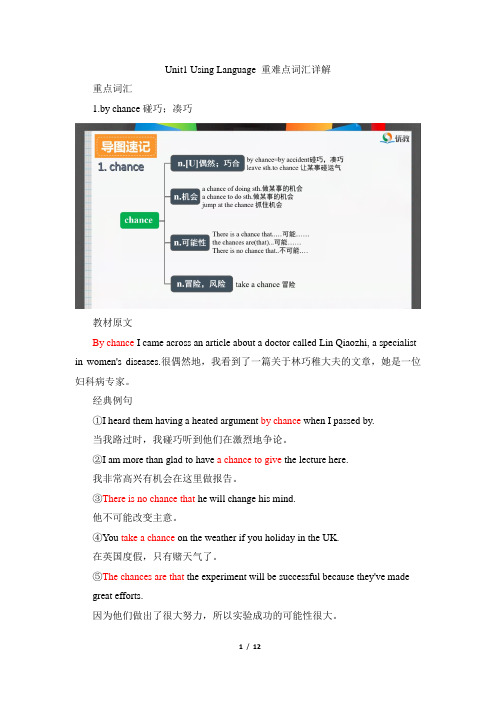
Unit1 Using Language 重难点词汇详解重点词汇1.by chance碰巧;凑巧教材原文By chance I came across an article about a doctor called Lin Qiaozhi, a specialist in women's diseases.很偶然地,我看到了一篇关于林巧稚大夫的文章,她是一位妇科病专家。
经典例句①I heard them having a heated argument by chance when I passed by.当我路过时,我碰巧听到他们在激烈地争论。
②I am more than glad to have a chance to give the lecture here.我非常高兴有机会在这里做报告。
③There is no chance that he will change his mind.他不可能改变主意。
④You take a chance on the weather if you holiday in the UK.在英国度假,只有赌天气了。
⑤The chances are that the experiment will be successful because they've madegreat efforts.因为他们做出了很大努力,所以实验成功的可能性很大。
⑥Do you think there is a chance that you could be persuaded to change your mind?你觉得你有可能被说服以至改变自己的决定吗?⑦The chances are you won't have to pay.你可能不用付钱。
e across(偶然)遇见;碰见教材原文By chance I came across an article about a doctor called Lin Qiaozhi,a specialist in women's diseases.很偶然地,我看到了一篇关于林巧稚大夫的文章,她是一位妇科病专家。
高中英语(人教版必修4)教师用书:Unit 1 Section_Ⅲ Learning_about_Language_-_Using_Language (含答案)
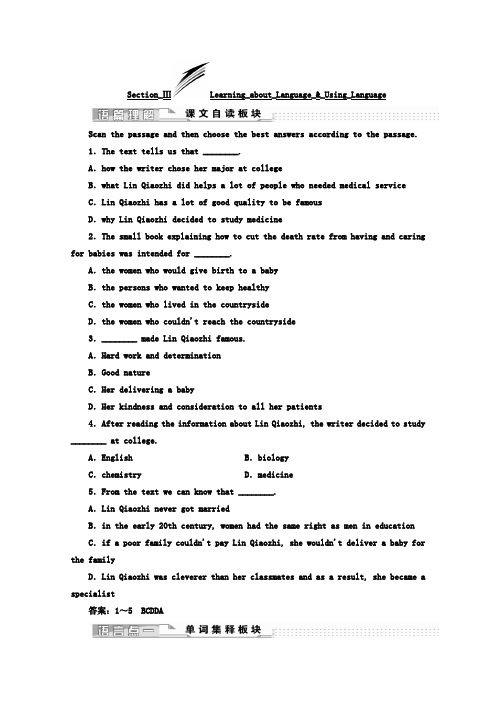
Section_ⅢLearning_about_Language_&_Using_LanguageScan the passage and then choose the best answers according to the passage.1.The text tells us that ________.A.how the writer chose her major at collegeB.what Lin Qiaozhi did helps a lot of people who needed medical serviceC.Lin Qiaozhi has a lot of good quality to be famousD.why Lin Qiaozhi decided to study medicine2.The small book explaining how to cut the death rate from having and caring for babies was intended for ________.A.the women who would give birth to a babyB.the persons who wanted to keep healthyC.the women who lived in the countrysideD.the women who couldn't reach the countryside3.________ made Lin Qiaozhi famous.A.Hard work and determinationB.Good natureC.Her delivering a babyD.Her kindness and consideration to all her patients4.After reading the information about Lin Qiaozhi, the writer decided to study ________ at college.A.English B.biologyC.chemistry D.medicine5.From the text we can know that ________.A.Lin Qiaozhi never got marriedB.in the early 20th century, women had the same right as men in education C.if a poor family couldn't pay Lin Qiaozhi, she wouldn't deliver a baby for the familyD.Lin Qiaozhi was cleverer than her classmates and as a result, she became a specialist答案:1~5 BCDDA根据英文释义和首字母提示写出下列单词1.intend (v.) to plan to do something2.emergency (n.) an unexpected situation involving danger in which immediate action is necessary3.generation (n.) a group of people in society who are born and live around the same time4.deliver (v.) to take goods, letters, etc. to the person or people they have been sent to5.consideration (n.) the act of thinking carefully about sth.6.kindness (n.) kind behaviour towards someone1.intend vt.计划;打算★背诵佳句培养语感(教材原句) I looked carefully at the text and realized that it was intended for women in the countryside.我细细地看了这篇文章,了解到那是为农村妇女写的。
Unit+4+Using+Language+教学设计 高中英语人教版(2019)选择性必修第一册
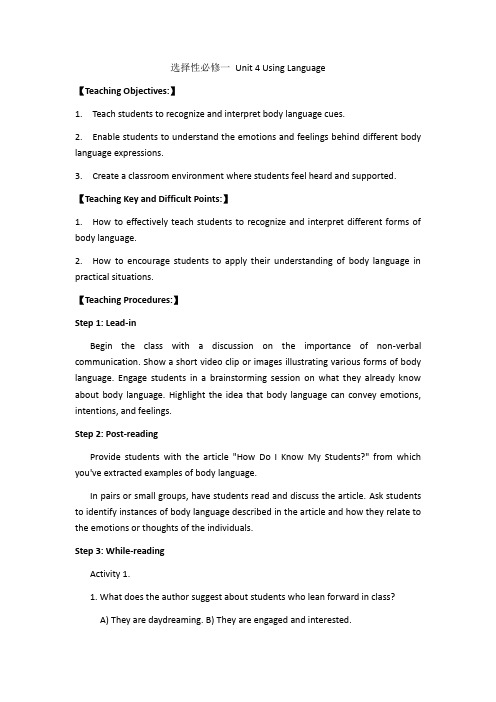
选择性必修一Unit 4 Using Language【Teaching Objectives:】1.Teach students to recognize and interpret body language cues.2.Enable students to understand the emotions and feelings behind different body language expressions.3.Create a classroom environment where students feel heard and supported.【Teaching Key and Difficult Points:】1.How to effectively teach students to recognize and interpret different forms of body language.2.How to encourage students to apply their understanding of body language in practical situations.【Teaching Procedures:】Step 1: Lead-inBegin the class with a discussion on the importance of non-verbal communication. Show a short video clip or images illustrating various forms of body language. Engage students in a brainstorming session on what they already know about body language. Highlight the idea that body language can convey emotions, intentions, and feelings.Step 2: Post-readingProvide students with the article "How Do I Know My Students?" from which you've extracted examples of body language.In pairs or small groups, have students read and discuss the article. Ask students to identify instances of body language described in the article and how they relate to the emotions or thoughts of the individuals.Step 3: While-readingActivity 1.1. What does the author suggest about students who lean forward in class?A) They are daydreaming. B) They are engaged and interested.C) They are angry or afraid. D) They are distracted.2. According to the article, why might a student hide their face in their hands?A) They are embarrassed or ashamed. B) They are excited about the lesson.C) They want to avoid eye contact. D) They are happy.3. Why does the author emphasize the importance of reacting to body language in the classroom?A) To make students uncomfortable. B) To assess students' academic abilities.C) To create a supportive learning environment.D) To encourage students to speak more in class.Activity 2. Present a list of common body language cues (e.g., eye contact, facial expressions, posture, gestures). Discuss each cue's meaning and how it can vary in different contexts.Activity 2. Show images or short video clips of people exhibiting various forms of body language. Have students analyze and interpret the body language cues in these examples.Step 4: Post- readingActivity 1. Provide students with real-life scenarios (e.g., job interviews, social interactions, classroom situations). In pairs or small groups, have students role-play these scenarios while paying attention to their body language. Encourage peer observation and feedback on body language cues during role-play.Activity 2. Lead a class discussion on the importance of empathy in understanding others. Discuss how recognizing body language can lead to more empathetic communication. Have students share their insights and experiences on how body language affects their daily interactions.【Homework Assignment】Assign students to observe and record instances of body language in their daily lives.Have them reflect on how recognizing body language influenced their interactions.Encourage students to write a short reflection essay or share their experiences in the next class.。
人教课标版高中英语必修1 Unit4_Using_Language长难句型精析
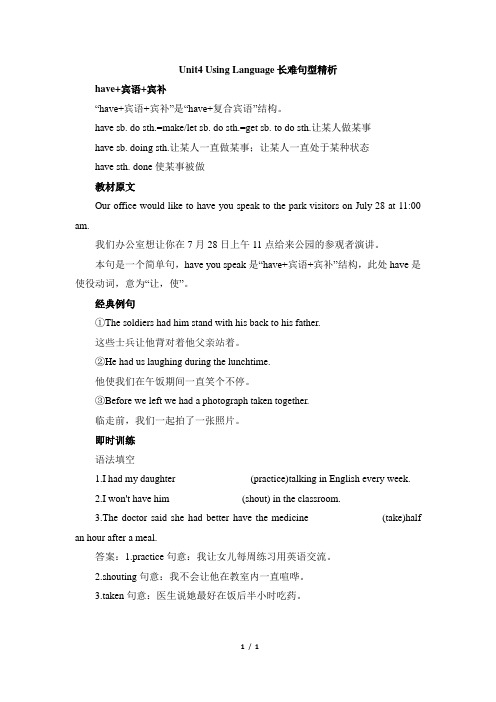
Unit4 Using Language长难句型精析have+宾语+宾补“have+宾语+宾补”是“have+复合宾语”结构。
have sb. do sth.=make/let sb. do sth.=get sb. to do sth.让某人做某事have sb. doing sth.让某人一直做某事;让某人一直处于某种状态have sth. done使某事被做教材原文Our office would like to have you speak to the park visitors on July 28 at 11:00 am.我们办公室想让你在7月28日上午11点给来公园的参观者演讲。
本句是一个简单句,have you speak是“have+宾语+宾补”结构,此处have是使役动词,意为“让,使”。
经典例句①The soldiers had him stand with his back to his father.这些士兵让他背对着他父亲站着。
②He had us laughing during the lunchtime.他使我们在午饭期间一直笑个不停。
③Before we left we had a photograph taken together.临走前,我们一起拍了一张照片。
即时训练语法填空1.I had my daughter ______________ (practice)talking in English every week.2.I won't have him ______________(shout) in the classroom.3.The doctor said she had better have the medicine ______________(take)half an hour after a meal.答案:1.practice句意:我让女儿每周练习用英语交流。
外研必修第一册Unit4_Using_language_名师课件
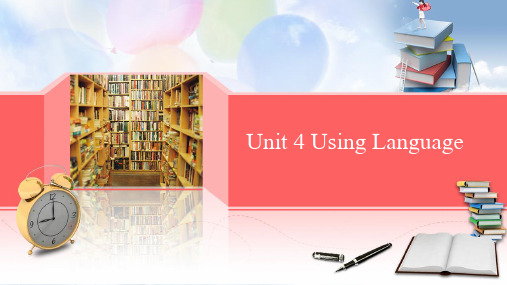
Presentation c We can... stay in touch with people. We want to remain friends with them. d The digital age also enables us to find people. These people share our interests…
Presentation
1. Now look for more sentences with these structures in the reading passage. Click for a friend P38-39 2. Sum up the words used in attributive 3. Complete the table
2. 介词常受先行词的制约(即介词和先行词的搭 配),例如:He built a telescope through which he could study the skies. (through which 即 through the telescope)
Co-construction
words
that which who whom whnt
other examples
Co-construction Grammar focus:Attributive clauses
一、定义:在复合句中,用来修饰名词或代词的从 句就叫做定语从句。这个从句在主句中充当定语成 分。被修饰的词叫先行词。引导定语从句的词叫引 导词,有关系代词和关系副词两类。 定语从句不同于单词作定语的情况,它通常只能放 在被修饰的词(即先行词)之后。
Unit 4 Using Language
课时目标:
- 1、下载文档前请自行甄别文档内容的完整性,平台不提供额外的编辑、内容补充、找答案等附加服务。
- 2、"仅部分预览"的文档,不可在线预览部分如存在完整性等问题,可反馈申请退款(可完整预览的文档不适用该条件!)。
- 3、如文档侵犯您的权益,请联系客服反馈,我们会尽快为您处理(人工客服工作时间:9:00-18:30)。
kindness
Qualities
patience
responsibility devoted
Retell the story.
Lin Qiaozhi wrote a small book for
_______ countryside who were mothers in the __________
She became a specialist in women’s diseases.
Careful Reading:
(
1). From Para.1,what can we infer? A. The writer’s homework was to change her life. B. The writer liked biology and chemistry. C. The writer was a middle school student. D. The writer was studying at university. (2) The main idea of the passage is _____ A. Lin Qiaozhi’s achievements as a doctor B. that the writer was greatly inspired by Lin Qiaozhi and decided to study at medical college C. that Lin Qiaozhi helped lots of poor people in the countryside D. why Lin Qiaozhi chose to be a doctor
Unit 1
Women of achievement
Reading: Why not carry on her good work?
Cynthia
Review and lead in:
What qualities do you think a great woman needs? (Give some words to describe)
(3).The small book explaining how to cut the death rate is for the women who A. care for babies B. live in the countryside C. will deliver a baby D. need advice on medicine (4). Which of the following statements about Lin Qiaozhi is NOT true? A. She did some research on great women in China. B. She wrote a book for women in the countryside about how to cut the death rate from having and caring for babies. C. She is a hard-working women with determination and gentle nature. D. Her kindness and consideration made her succeed later.
(5). From the passage we can infer that______ A. in the early 20th century women didn’t have the same right as men in education B. Lin Qiaozhi was a specialist because she was the cleverest lady of her time C. as a university student, the writer decided to be a second Lin Qiaozhi D. poor people in the countryside could never reach a doctor if they had an emergency
A. of B. in C. for D. by
2).come across(偶然)遇见/发现 e.g.
⑴ 我昨天偶然碰到了一个老朋友。 I _________________________yesterday. came across an old friend
⑵ 她在抽屉里偶然发现一些旧照片。 She ________________________ came across some old photos in a drawer.
Important expressions:
do research
catch one’s eye
做研究
引起某人的注意
be intended for
as well as deliver a baby
为…准备;预定
和;也;又 接生
find out
找出
devote one’s whole life to carry on by chance too…to
1.What do you know about Lin Qiaozhi? (a doctor, a specialist in women’s diseases …) 2. Which adjectives could you use to describe her ?
devoted, kind, inspired, respected, clever, …
2. catch sb’s eye 引起 (某人) 注目
e.g. When I entered his new house, a beautiful picture caught my eye.
3.intend vt. 计划;打算
be intend for “为……而准备, 预定” e.g. The chair was intended for you but she took it away.
Homework
1. Remember the following words and expressions. do research on, by chance, come across, cut the death rate, intend, emergency, generation, kindness, consideration, deliver, carry on 2.Retell the story.
intelligent generous modest hard-working confident determined kind unselfish brave considerate….
Reading
Why not carry on her good work?
Lin Qiaozhi
Pre-reading
献出某人的一生 进行…,继续前进… (偶然)遇见;碰见
太…而不能
Fast reading
Answer the following the questions:
1. Who is the main character in the text? 2. When did she live? From 1901 to 1983.
5.deliver vt.递送;生(小孩儿);接生;发表(演说等) deliver sth.to sb.把某物交付给某人 deliver a speech 作演讲 deliver a baby 接生 ⑴ He instructed me to deliver it ____a to customer.
not able to get to a hospital easily. It was to _________ look after their babies help them to _________
properly.
twentieth Qiaozhi lived in the early ________ century ______. It was not easy ____ for women to get medical education at that time. Education _______________ second She was for men first ___ and women ______. chose to study at medical college because she help other women. wanted to ______ I think Lin Qiaozhi is a good doctor and a great woman _____________.
Group work: Work in groups to discuss what are the important
qualities a good doctor should have.
intelligence consideration gentle nature
determination
Thank you
Language points
1. By chance I came across an article about a doctor called Lin Qiaozhi, a specialist in women’s diseases. 1). by chance碰巧、凑巧。 e.g. We hadn’t planned to meet. We met ______ chance.
A doctor who became a specialist in women’s illnesses. She devoted all her life to medical work for Chinese women and children. Her work encouraged many other women to become doctors. Lin Qiaozhi (1901-1983) China
